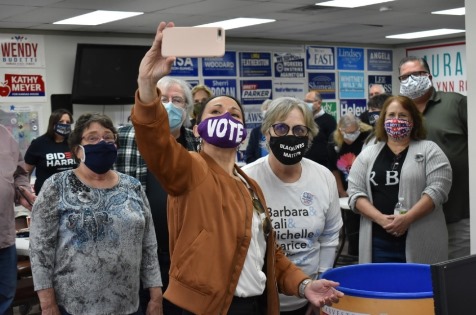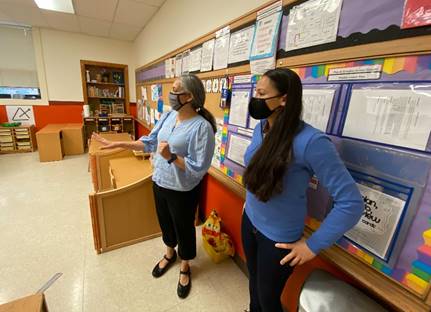Now that Congress has killed a major bill changing election rules, redrawing legislative and congressional lines will fall to the Republican-controlled Kansas Legislature. That could endanger the only Democrat representing Kansas on Capitol Hill.

by Abigail Censky, KCUR and Kansas News Service
Topeka, Kansas — When Republicans in Congress blocked debate on the Democratic-led elections overhaul bill last week, it dashed U.S. Rep. Sharice Davids’ hopes that her district could be redrawn by an independent commission.
Instead, the Republican-controlled Kansas Legislature looks poised to draw maps used for the 2022 election and likely to determine political careers for the next decade.
With a nonpartisan panel charting the new districts based on the 2020 Census, Rep. Davids could expect to run for re-election in a district fairly similar to the one that elected her to the U.S. House twice.
With redistricting left to state lawmakers, the Republicans who dominate the Legislature have more freedom to gerrymander — the practice of manipulating a voting district to ensure a favorable outcome for one party. Rep. Davids told MSNBC in early June she’s worried that state Republicans are “saying, ‘If you can’t beat ‘em, cheat ‘em.’”
Former state Senate President Susan Wagle said nearly as much to a group of conservatives in Wichita last fall.
Gov. Laura Kelly can veto the redistricting plan. But Republicans would have the votes to override her.
“We can do that, I guarantee you,” Wagle said. “We can draw four Republican congressional maps.”
That video went viral. Democrats and The Kansas City Star editorial board alleged Republicans were saying the quiet part out loud.
Kansas is one of 29 states where the state legislature wields total control over redrawing the lines of both state legislative and congressional districts. For now, the 2020 Census data is delayed. That forces lawmakers to contemplate whether to begin holding town halls across the state for public input on the new maps without the latest population numbers. All the information the state needs to draw new maps should arrive by the end of September.
Lawmakers could theoretically begin to work with the state’s legislative research department to draft maps then. But that process could remain behind closed doors until legislators return to session next January. Here are four strategies that the Republican-controlled body may use to oust Rep. Davids from her seat:
Kansas’ 1st Congressional District, which stretches from Emporia to the Colorado border, has lost population over the last decade while Kansas City commuter counties like Johnson and Wyandotte have grown. That change will need to be reconciled in new maps. The Kansas Legislative Research Department says each of Kansas’ four congressional districts will need to have roughly 734,470 people.
The drawing board
Republicans could dilute the strength of Johnson County, the state’s bluest and most populous county, by adding part of Johnson County to the state’s 2nd Congressional District. But that could put Republican U.S. Rep. Jake LaTurner, who represents Topeka and Lawrence, in jeopardy by making his district more Democratic.
Michael Smith, a political science professor at Emporia State University, said you’d have to do more than strip out Wyandotte County to make the 3rd District losable for Rep. Davids, given her vote totals and President Joe Biden’s eight-point victory there.
“You have to split Johnson County in order to achieve that,” Smith said.
Yet that risks infuriating constituents and groups that want to remain together in the county that’s home to more than 20% of the state’s population and produces a quarter of its GDP, Smith said.
Toy with Wyandotte County
The 3rd Congressional District currently covers all of Johnson and Wyandotte counties and parts of Miami County. Republicans could further weaken Democrats by shifting the borders so parts of reliably Democratic Wyandotte County get included in the sprawling, heavily Republican and mostly rural 1st Congressional District.
“I absolutely think that there are some individuals in the Legislature that will want to give it a try,” Smith said.
State Sen. Ethan Corson, a Democrat from Johnson County and former executive director of the state party, said shifting Wyandotte out of the district could backfire on Republicans.
“I don’t think that’s going to pass legal scrutiny,” Corson said.
Veto override
Democratic Gov. Laura Kelly can veto any maps that don’t keep counties whole, dilute minority voting strength or don’t keep districts “clear and contiguous” as prioritized in the redistricting guidelines used by the state in 2002 and 2012.
But after winning seats in the 2020 elections, Kansas Republicans have an even stronger supermajority in the Legislature. If Kelly vetoed a map that endangers Rep. Davids, they could override her. However, the Kansas Supreme Court will still need to approve the final maps.
Running out the clock
A dramatically less plausible fourth strategy for Republicans would be to stall and cross their fingers that Kelly isn’t re-elected to a second term. Then a Republican governor could sign off on their maps.
Ten years ago, Kansas was the last state to draw its congressional districts because of a dispute between Republicans about where to move Manhattan. Federal courts intervened and drew the current maps.
But congressional and state legislative candidates are required to file to run for office by June 1, 2022, so maps need to be drawn before the end of next year’s session in May.
“The courts will run out of patience, the federal courts in particular,” Smith said. So, running out the clock really isn’t a practical option because the courts will just “draw the district if they drag this out too long.”
Abigail Censky is the political reporter for the Kansas News Service. You can follow her on Twitter @AbigailCensky or email her at abigailcensky (at) kcur (dot) org.
The Kansas News Service is a collaboration of KCUR, Kansas Public Radio, KMUW and High Plains Public Radio focused on health, the social determinants of health and their connection to public policy.
Kansas News Service stories and photos may be republished by news media at no cost with proper attribution and a link to ksnewsservice.org.

